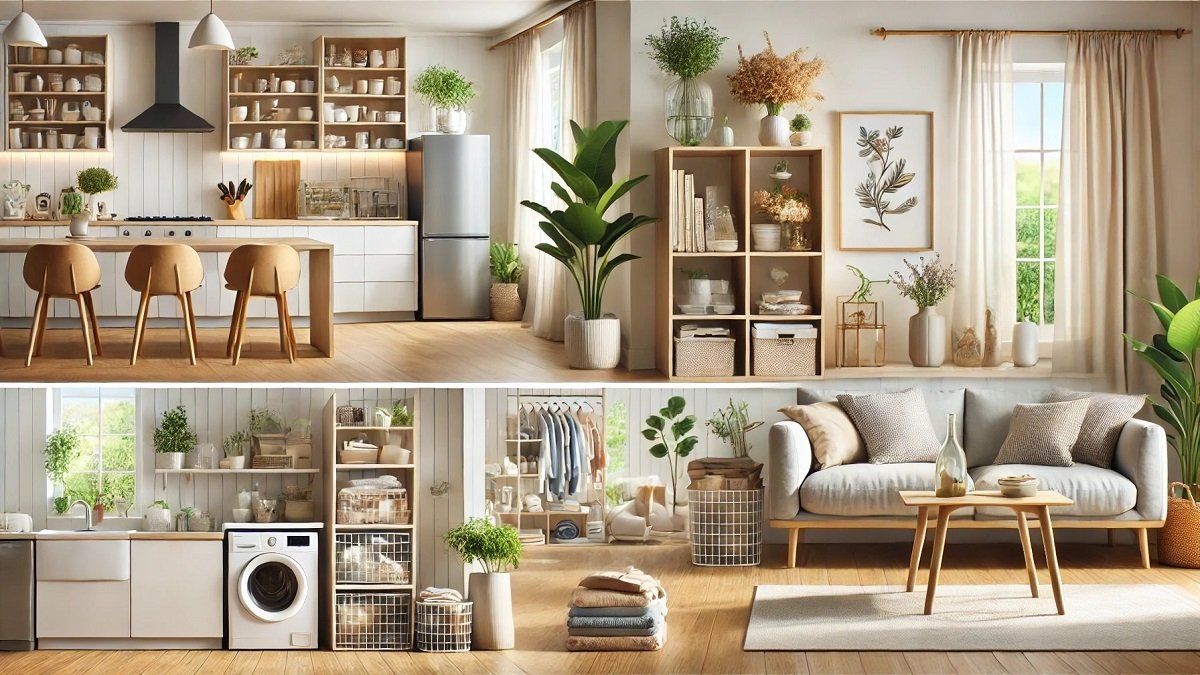In this blog we talk about simple habits for a clutter-free home. A few years ago, we made a choice that changed our lives. We decided to get rid of whatever we didn’t need from our house. We also moved into a smaller house and got rid of 60–70% of our belongings over a few years. Go figure.
We created easy routines to maintain a clutter-free house in addition to a major cleanup that made room for clutter-free living. In no way were they intrusive or bothersome. Just the reverse. Together, however, they go from our house in a constant condition of peace, or near it.
Adopt These Habits for a Clutter-Free Home

1. Take Care Of Physical Mail Right Away
All too often, mail is simply brought into the house, moved from the mailbox to the countertop, and left to accumulate, creating unnecessary clutter. We often ignore or procrastinate on sorting it through, which leads to more piles building up.
However, if we develop the simple habits for a clutter-free home with a habit of efficiently handling our mail, we can prevent it from becoming overwhelming. A good strategy is to immediately discard any junk or unwanted mail, whether by shredding it, which helps stop unwanted mail from coming in the first place.
For the remaining correspondence that requires attention but cannot be processed right away, it’s helpful to organize it in a dedicated spot, such as a manila folder marked “To-Do.” This way, the paperwork stays out of sight but is ready when you have time to address it. A little consistency in managing mail can keep your home organized and free from paper clutter.
2. After Meals, Wash The Dishes
Dishwashing is often viewed as a dreaded chore, especially after the time and energy spent cooking and eating. The thought of standing over a sink, scrubbing plates, or loading the dishwasher can feel exhausting. However, after reflecting on a different perspective, you may find that dishwashing can become a more manageable and even satisfying task.
Instead of seeing it as a burden, consider it the final stage of the family meal. By handling dishes immediately after eating—whether by loading them into the dishwasher or washing them by hand—you avoid the buildup of dried-on food, which can be much harder to clean later.
This simple habit saves time and effort in the long run. Plus, by cleaning as you go, your kitchen stays neat and clutter-free throughout the evening, creating a more relaxed and enjoyable atmosphere at home. With this shift in mindset, dishwashing can become just another part of the pleasant routine.
3. Make Your Bed Daily
Messes have a way of attracting more messes, and one of the easiest places to observe this phenomenon is in the bedroom. The bed is the central focal point of the room, and when it’s made, it sets a positive tone for the entire space. A neatly made bed can create a sense of order, calm, and productivity, transforming the entire atmosphere of the room.
On the other hand, if the bed isn’t made, it becomes the perfect breeding ground for clutter. Small items like clothes, books, or random belongings tend to accumulate around the unmade bed, creating more mess and making it harder to maintain a clean environment.
Starting your day with one of the daily habits for a clutter-free home, like making the bed, is the simplest yet most effective way to kickstart the habit of tidying up. It’s a quick and easy task that helps foster a clutter-free mindset, setting you up for a more organized and peaceful day ahead.
4. Organize Your Closet Seasonally
Setting a goal to organize your closet every three months is an excellent way to maintain an organized and functional wardrobe. Over time, we accumulate items that no longer serve us, whether they’re worn-out clothes, pieces that no longer fit, or items we simply never wear. For example, those stylish pants you bought ten years ago may no longer be relevant to your current style or may not fit properly anymore.
By regularly reviewing your closet and getting rid of things you no longer need, you create space for the clothes you truly wear and love. Additionally, taking inventory of what you already own can save you money. By checking what’s already in your closet, you may realize you don’t need to buy another white button-down shirt or similar item, helping you make more mindful and budget-friendly purchases.
5. Keep Anything Away From The Kitchen Counter
Clutter draws clutter, and messes seem to attract even more messes. The more clutter we allow to accumulate, the more it tends to pile up, creating an overwhelming environment. However, the more adept we become at simple habits for a clutter-free home and organizing our spaces, the less likely it is to build up in the first place.
A great example of this can be found in the kitchen, particularly on the countertop. Often, countertops become dumping grounds for keys, mail, or random items. The more we place there, the more items seem to find their way to the surface, creating a cycle of mess. On the other hand, maintaining a spotless countertop promotes a sense of serenity and order.
6. Collect Things You Frequently Reach For
When you sit down on the sofa to relax, it’s easy to find yourself reaching for different items like your charger, a snack, your nail file, or a craft project. Instead of letting these things scatter across the couch or table, create a designated space for them. Use a nice basket or container to gather your daily essentials in one place.
This simple organizational step ensures that everything you need is easily accessible and neatly stored. Not only will this eliminate clutter, but it also saves you time looking for things when you need them most. No more hunting for your charger or digging through drawers for a nail file; everything will be right at your fingertips.
Plus, the tidy arrangement of these items enhances the overall aesthetic of your living space, allowing you to enjoy your downtime without distractions or mess. It’s a small change that makes a big difference in efficiency and organization.
7. Return Items Promptly
We discovered that cleaning up became much easier when we owned fewer belongings. With fewer items around, each one has a clear function and a designated place. This simplicity reduces the chances of things piling up and makes it easier to maintain a tidy environment.
At the end of each day, we return items to their proper spots, ensuring that everything is organized and in order. Adopting this one of the daily habits for a clutter-free home can have a significant impact on our daily routine. One of the key benefits is that it allows each morning to start clean, fresh, and new.
Waking up to a clutter-free space creates a peaceful, organized environment that sets a positive tone for the day ahead. It also saves time and energy, as there’s no need to spend extra minutes searching for things or cleaning up unnecessary clutter. By making this habit a priority, we cultivate a more streamlined and stress-free lifestyle.
8. Finish Tasks That Take 1-2 Minutes Right Away
Procrastinating on decisions or leaving small tasks undone often leads to clutter in our homes. These unfinished tasks pile up over time, creating unnecessary mess and stress. A simple but effective guideline to combat this cycle of procrastination is, if a task can be completed in less than two minutes, do it immediately.
This can include putting your dirty clothes in the hamper, returning the remote control to its rightful place, washing that pot, or taking out the trash. By taking care of these small tasks right away, you prevent them from accumulating into larger messes. Every time you follow through on a quick task, you eliminate a potential source of clutter and create a more organized living space.
This habit not only helps maintain cleanliness but also fosters a sense of accomplishment and reduces the overwhelming feeling that comes from an unaddressed to-do list. Keeping up with small tasks prevents clutter from taking over.
9. Reduce Cluttered Areas Immediately
Too many items crammed into too small a space—whether it’s an overstuffed drawer filled with clothes, a crowded closet stuffed with linens, a bathroom cabinet overflowing with toiletries, or shelves cluttered with miscellaneous items—are clear signs of clutter. When this happens, as it frequently does, it’s essential to address it immediately rather than letting the mess grow.
Begin by eliminating everything you no longer need or use. Don’t delay—taking just a few minutes to clear out unnecessary items will make a huge difference. While it might take more than two minutes, it often won’t take longer than fifteen to go through and sort the excess.
By staying on top of these small clutter hotspots, you can prevent them from becoming overwhelming. The key to completely eradicating clutter is to tackle it regularly and proactively, ensuring that spaces don’t get overcrowded in the first place. Maintaining this habit will keep your environment organized and stress-free.
Benefits Of A Clutter-Free Home
A clutter-free home is more than just aesthetically pleasing; it offers numerous benefits that can positively impact your mental, physical, and emotional well-being. Here are some of the key advantages of living in a clutter-free environment:
Reduced Stress and Anxiety: Clutter can be overwhelming, causing feelings of stress and anxiety. The more things you have around you, the more your brain has to process, leading to mental exhaustion. A tidy, organized space promotes calmness and relaxation, helping reduce stress levels.
Increased Productivity: A clutter-free home fosters better focus and concentration. When your environment is clean and organized, you can work, study, or even relax without distractions. A neat space enables you to find what you need quickly, saving time and allowing you to accomplish tasks more efficiently.
Improved Sleep: A cluttered bedroom can interfere with your ability to wind down and get restful sleep. A clean, organized space creates a peaceful atmosphere, promoting relaxation and improving your quality of rest.
Healthier Living Environment: Clutter can accumulate dust, dirt, and allergens, which can negatively affect your health. By keeping your home organized, you make it easier to clean and maintain a healthier living space.
Enhanced Relationships: A clutter-free home can also improve relationships. A tidy environment promotes harmony and reduces arguments about cleaning and organizing, allowing you to spend more quality time with your loved ones.
The simple habits for a clutter-free home provide a sense of order, promote well-being, and enhance overall quality of life. Making the effort to keep your living space organized can lead to a happier, more productive, and healthier lifestyle.
FAQ
Q: How do individuals manage to keep their houses clutter-free?
A: It will also be simpler for you to adopt said behaviors when you have experienced the liberation and stress-free lifestyle that comes with clutter-free living. A few of these behaviors will occur every day: After every meal, clean the kitchen. Returning everyday objects (clothing, books, and toys) to their proper places.
Q: What does it mean to clear clutter?
A: To “remove clutter” is to get rid of things that aren’t needed or desirable in order to make a room or situation more functional and orderly.
Q: What does a clutter-free atmosphere mean?
A: A neat and orderly workstation is one in which inventory, tools, and supplies are all placed appropriately and superfluous objects are cleared out. By making necessary objects easily accessible and minimizing distractions, a well-organized workspace enhances productivity, safety, and mental well-being.











